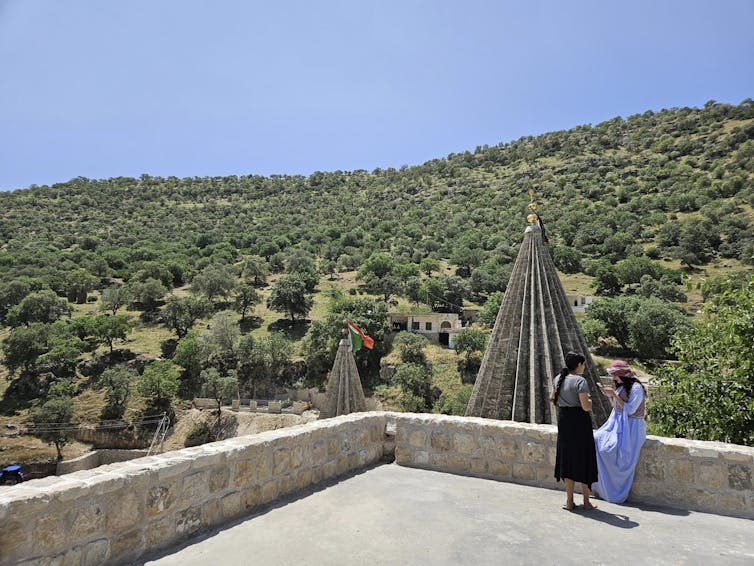Ten years ago, on August 3, fighters from Islamic State (IS) left their bases in Syria and Iraq to attack the Sinjar region of north-western Iraq. Sinjar was home to the Yazidi people, a religious group native to the region. IS saw religious groups like the Yazidi as blasphemous and aimed to wipe them out.
Without much warning, around 350,000 Yazidis were forced to flee their homes and many sought refugee on Mount Sinjar, a mountain that the Yazidi see as sacred. Hundreds of children and elderly people died from dehydration and exposure as IS forces besieged the mountain. IS fighters were only pushed back a few days later by Iraqi and Kurdish troops, assisted by US airstrikes.
IS was prevented from wiping out all of the Yazidi on Mount Sinjar. But the group captured thousands of Yazidi men, women and children. All of the men were killed in front of their families, along with many elderly women and children. Some were even buried alive. The women and children who survived were taken to Syria, where they were sold and sexually enslaved by IS fighters.
IS also targeted and killed members of other minority groups in the area, such as the Shabak, Turkmen and Christians. According to the UN, over 5,000 Yazidis were killed and thousands more were abducted in a campaign that amounted to genocide.
Read more: A year after massacre by Islamic State, Iraq's Yazidis are clinging on
A decade on, around 150,000 Yazidi survivors still live in tents in displaced person camps in Iraqi Kurdistan, a semi-autonomous region of northern Iraq.
The Iraqi government is trying to close down these camps, and has offered US$3,000 (£2,300) to those willing to return to Sinjar. But many people in the camps, as well as the tens of thousands who fled overseas, are still afraid to go back to their homes.
IS was defeated militarily in Iraq – but the group, which retains many supporters in the region and has thousands of active fighters, still patrols and carries out attacks there. Between January and June 2024, IS carried out 153 attacks across Iraq and Syria – more than double its 2023 total.
This insecurity has been complicated by a number of other armed groups, as well as the militaries of neighbouring countries, that continue to operate in the region. The Turkish military, for example, often conducts strikes in Sinjar as part of its battle against the Kurdistan Workers’ Party (PKK), a group designated by the US and EU as a terrorist organisation.
Redressing the needs of survivors
In 2021, the Iraqi government passed its Yazidi female survivors’ law. This provides monthly compensation, land, rehabilitation and education to women and girls who experienced sexual slavery at the hands of IS, and also to those who survived the massacres or were forced to work as child soldiers.
In interviews I carried out in May 2024 with Yazidi survivors in northern Iraq, one female survivor who receives the monthly compensation said it has allowed her to become more “independent” and move out of her displaced person camp into rented accommodation. Another man said the money has “transformed” his life as he was jobless after being injured as a child soldier for IS.
However, survivors have faced some challenges in accessing these benefits. They have to complete a number of claim forms and go before police officers and court officials to speak of the harm they experienced. For victims of sexual violence, this can be stigmatising and silence them from speaking out about their suffering.
One survivor told me that claiming redress meant she “lost her dignity” and that the “process killed us”. Another who said the monthly compensation “doesn’t allow us to live peacefully” wanted to migrate abroad in the face of continuing insecurity in Iraq.
Iraqi courts have prosecuted more than 20,000 members of IS, and have sentenced 8,000 to death. Those on death row include one of the wives of the slain IS leader Abu Bakr al-Baghdadi, who was found guilty in July of helping the terrorist group detain and enslave Yazidi women and girls.
But most of the offenders have been prosecuted under anti-terrorism laws and haven’t been convicted of genocide or crimes against humanity. This means the crimes suffered by the Yazidi and other groups in Iraq have not been acknowledged, nor have the perpetrators been held to account.
The convictions have not, for example, led to information that would enable all 190 mass graves across Sinjar to be exhumed, or the return of the more than 2,000 Yazidis who are still missing.

The likelihood that the Yazidi will be able to chart a future in Iraq remains very low. Former members of IS are being returned to Iraq from the Al-Hol detention camp in Syria without any reconciliation process with their victims.
In 2023, UN special rapporteur Fionnuala Ní Aoláin found that conditions in the Al-Hol camp were “dire and extreme”, and said an end to the detention of people there was “an absolute imperative”. Most of the former IS members detained in the camp had joined IS voluntarily, or were children taken to Syria by their parents to live in the “caliphate”.
One Yazidi survivor told me they would not return to Sinjar because the “crimes were committed by our neighbours [there] who have moved home already”. Nevertheless, the Iraqi government is committed to closing the displaced person camps.
Redressing genocide effectively means not only repairing the harm of those who have suffered, but preventing it from happening again. Paying compensation to survivors and providing plots of land is not enough to prevent genocide from recurring.
Until the root causes of the crimes committed by IS are addressed, Iraq risks seeing genocide happen again. It is no surprise that many Yazidis see their future outside of Iraq.
Luke Moffett consults to the International Organisation for Migration.
This article was originally published on The Conversation. Read the original article.







